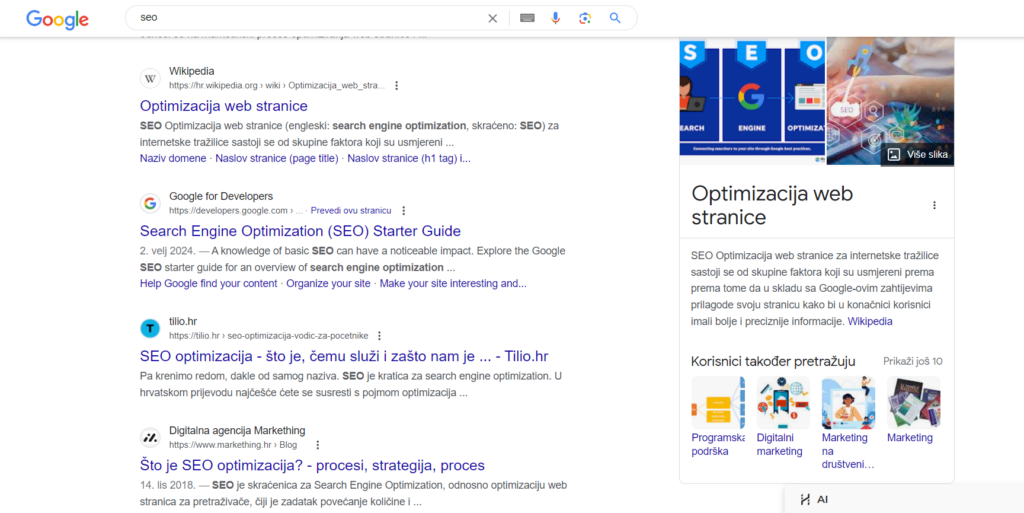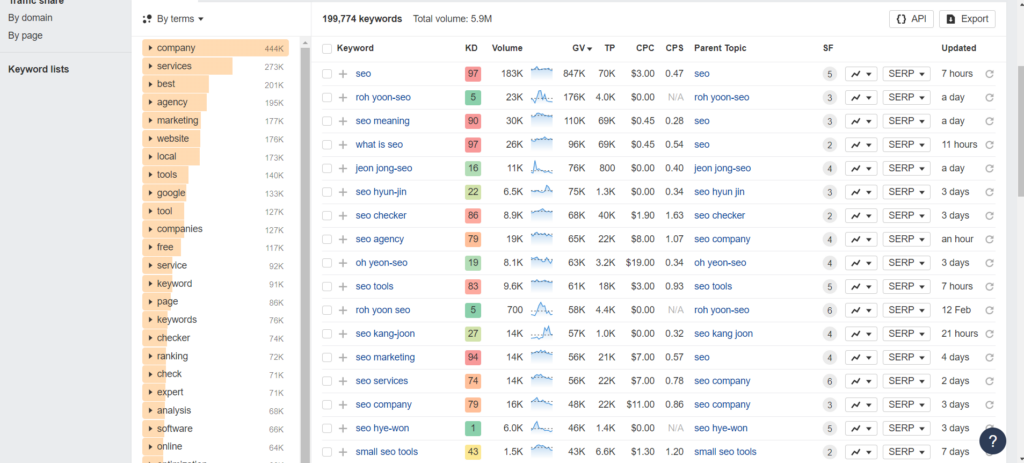Keywords form the basis of SEO optimization, which is a crucial aspect of online visibility. Search engines aim to present users with the most relevant content that matches their search query. Since textual keywords are used to describe content, whether in text, images or videos, it is essential to learn how to conduct effective keyword research to improve your online presence.
What are keywords?
Keywords are terms used to help a page rank higher in search results.
When a client asks me if they will be in the first position on Google, I always assure them that they will be. After we complete the optimization process, I can guarantee that their brand will be in position 1 when people search for it on the search engine.
The question is, how many people search for the brand every month?
What keywords are we looking for?
• For which the site can realistically rank
• Which have high monthly search volume and low keyword difficulty
• Which bring clients to website
• Which represent what is website all about
• Keywords connected with the one we want to rank for
The aim of keyword research
The main objective of search engine optimization (SEO) is to establish a website as an authority in a particular niche. To achieve this, it is crucial to understand the terminology used in that niche. This is where keyword research comes into play. The aim of keyword research is to discover all the relevant terms related to the niche and incorporate them into the website content in the most effective way possible.
An equally important goal is to step into the potential client’s shoes and find out what term would attract them to the site and how to respond to their needs.
Finding the main keyword
I use Ahrefs for research because I’m familiar with it. Although it’s expensive, it provides good quality work. Semrush is another good option, but it also comes with a high price tag. If you’re looking for something cheaper, Mangools or Ubersuggest are viable alternatives, but they have fewer options. On the other hand, Google Keyword Planner is a free tool that you can use as well.
In most cases, the homepage is optimized first. It is the page that visitors see first and on it they get information what the website is actually about.
Suppose we aim to rank the website of an SEO agency. The initial keyword that strikes our mind to rank the homepage is “SEO”. However, the question is whether the people who type “SEO” in a search engine actually intend to buy an optimization service?
Probably not. Rather, they are more likely to be interested in general information about what SEO is. This can be seen in the search engine results page (SERP) as Google offers content for this query that defines the term itself. Moreover, it is very challenging to rank for that term.

Let’s input the term “seo” into one of our tools and explore related terms. But first, we need to filter out any terms related to Koreans who have the habit of naming their children Seo.

Upon analysis, we have identified several more suitable options for the website of an SEO agency, like “SEO agency”, “SEO services”, “SEO marketing” or “SEO company”. These keywords are more specific, accurately reflect the user’s purpose, and are comparatively easier to rank with a sizeable search volume.
For each of them, we should determine how strong the competition is and find one with the best ratio of competition and search volume.
Voila! The main keyword for the page is here. In this case, my favorite would be “seo agency”.
Support keywords for other landing pages
While we are in our preferred SEO tool, we can easily access a list of all the terms related to “SEO”. Ahrefs, for example, displays most of these terms on the left-hand side of the screen, making it a simple task to compile a list.
Competition analysis tools like Neuronwriter can be a great source of terms as they help us identify the terms used by our competitors. Additionally, we can study the terms for which our competitors are ranked and the topics they write about, and take advantage of features such as Google auto-complete, People Also Asked, and related searches. Reddit and other forums can also be useful in determining what people are discussing.
Long – tail keywords
Long-tail keywords are search phrases that consist of more than two words. For example, “basics of keyword research” is a long-tail keyword. Although they have low search volumes, they also have less competition. Long-tail keywords are very specific and are usually used by people with a clear intention in mind. By using long-tail keywords, we can target a specific group of people who are more likely to be interested in our content.
Keyword clustering
And now that we have a massive pool of keywords, it is necessary to somehow group them into meaningful clusters connected by a common theme. This way we get groups of words that we can use to write blogs.
It’s a good idea to use interesting keywords for new landing pages. For instance, “local SEO” can be a suitable landing page because many people want their businesses to be visible on maps and accessible to clients in a particular area. Adding a “Local SEO” category in the site menu can attract the attention of both search engines and visitors.
It’s not easy, but it is necessary
Finding and grouping hundreds or thousands of keywords, even with the help of a tool, can be a challenging task. However, once you have completed this task, you will have a valuable source of knowledge about a specific niche. It’s not necessary to conduct all the research at once. You can gradually enter the area that the website wants to dominate and become familiar with the material. Success will eventually follow.

